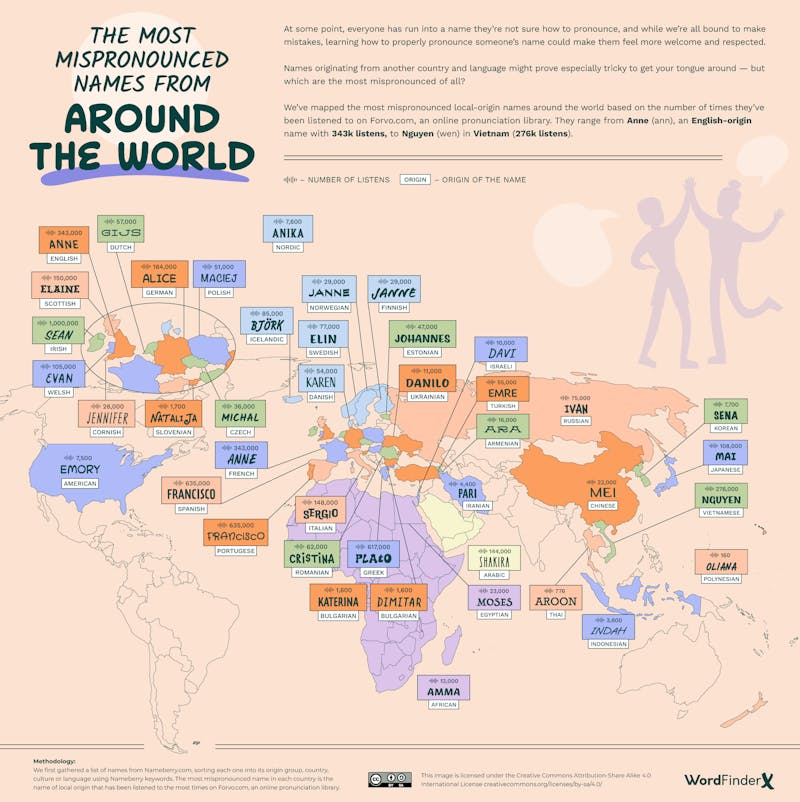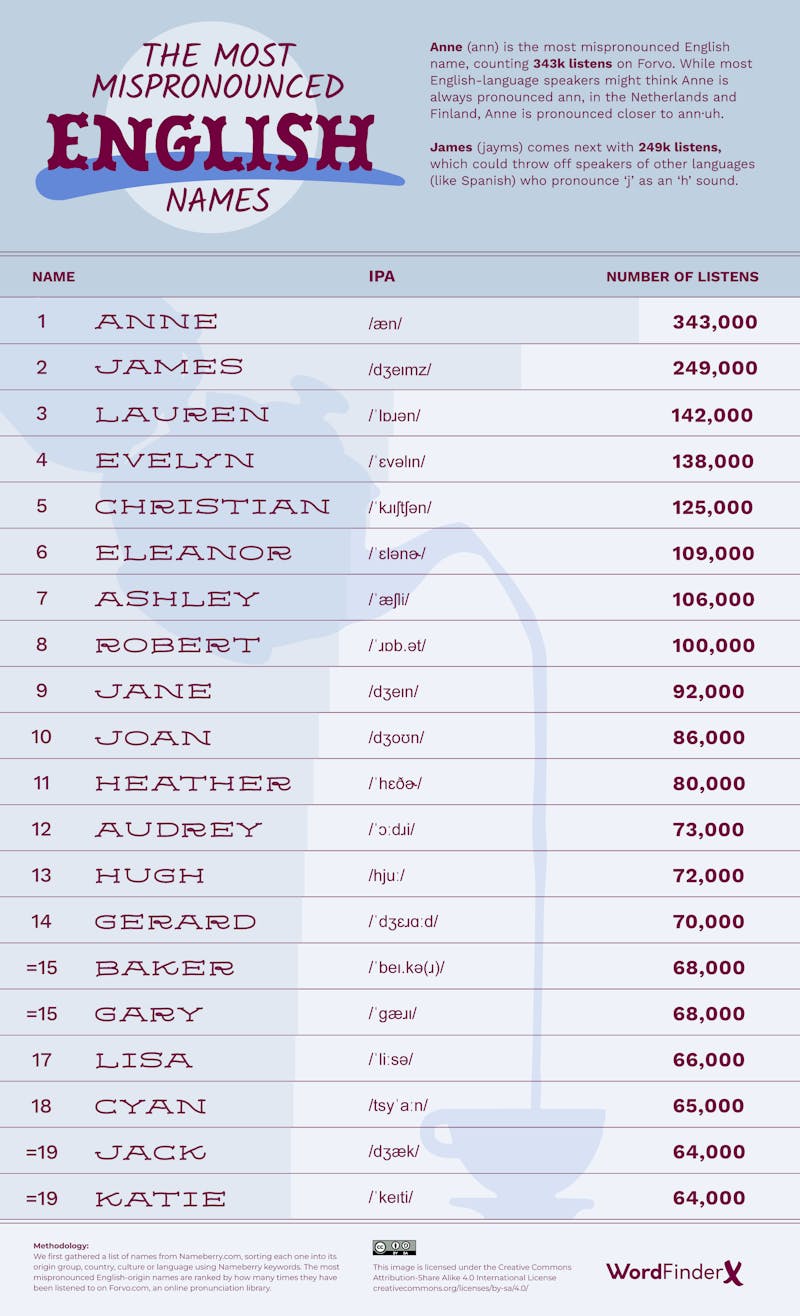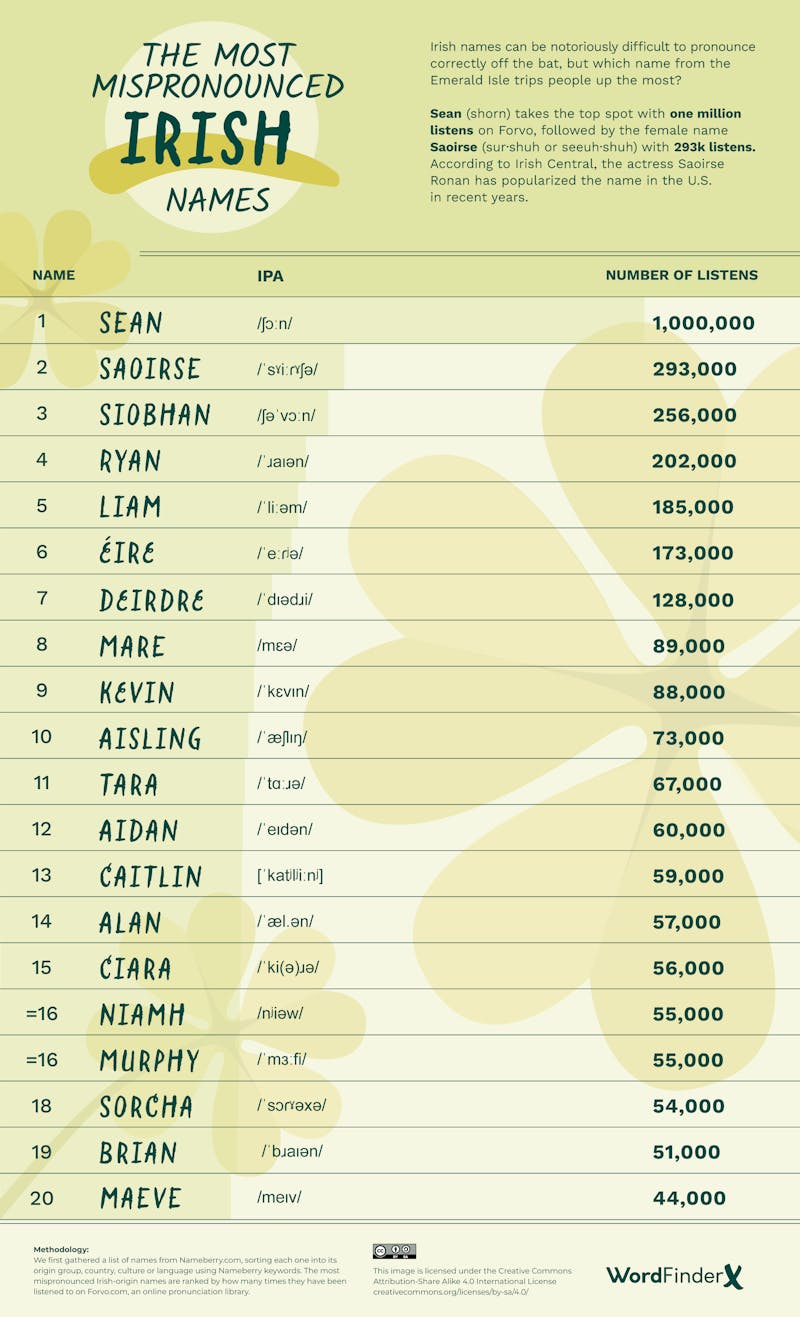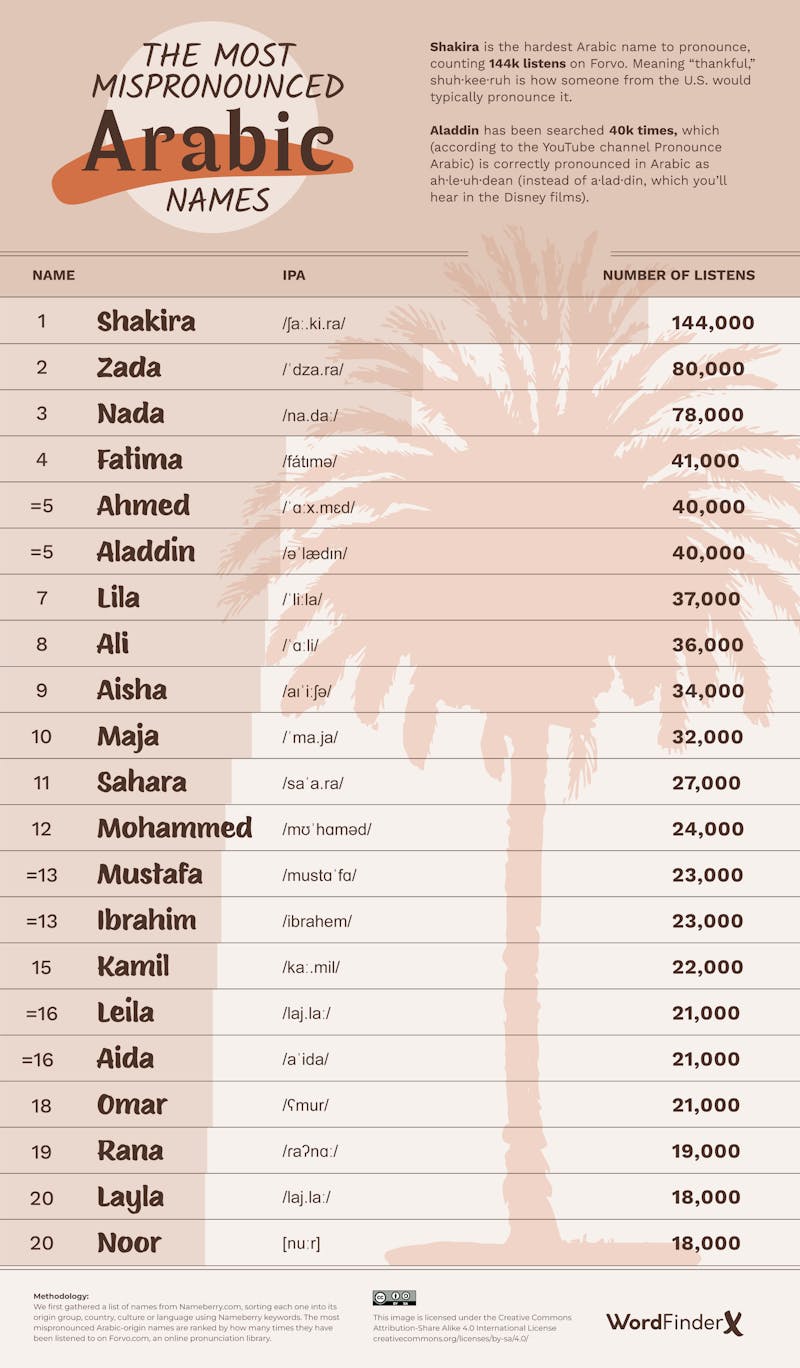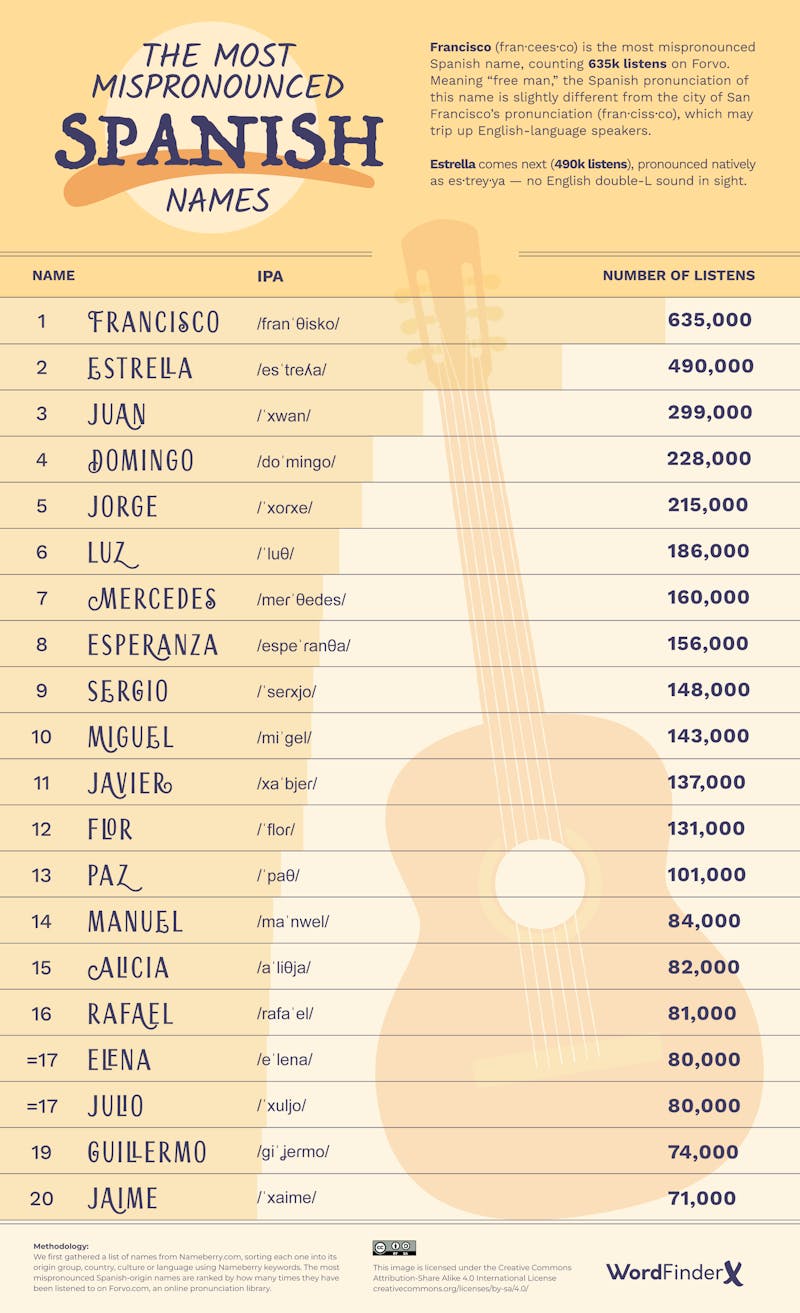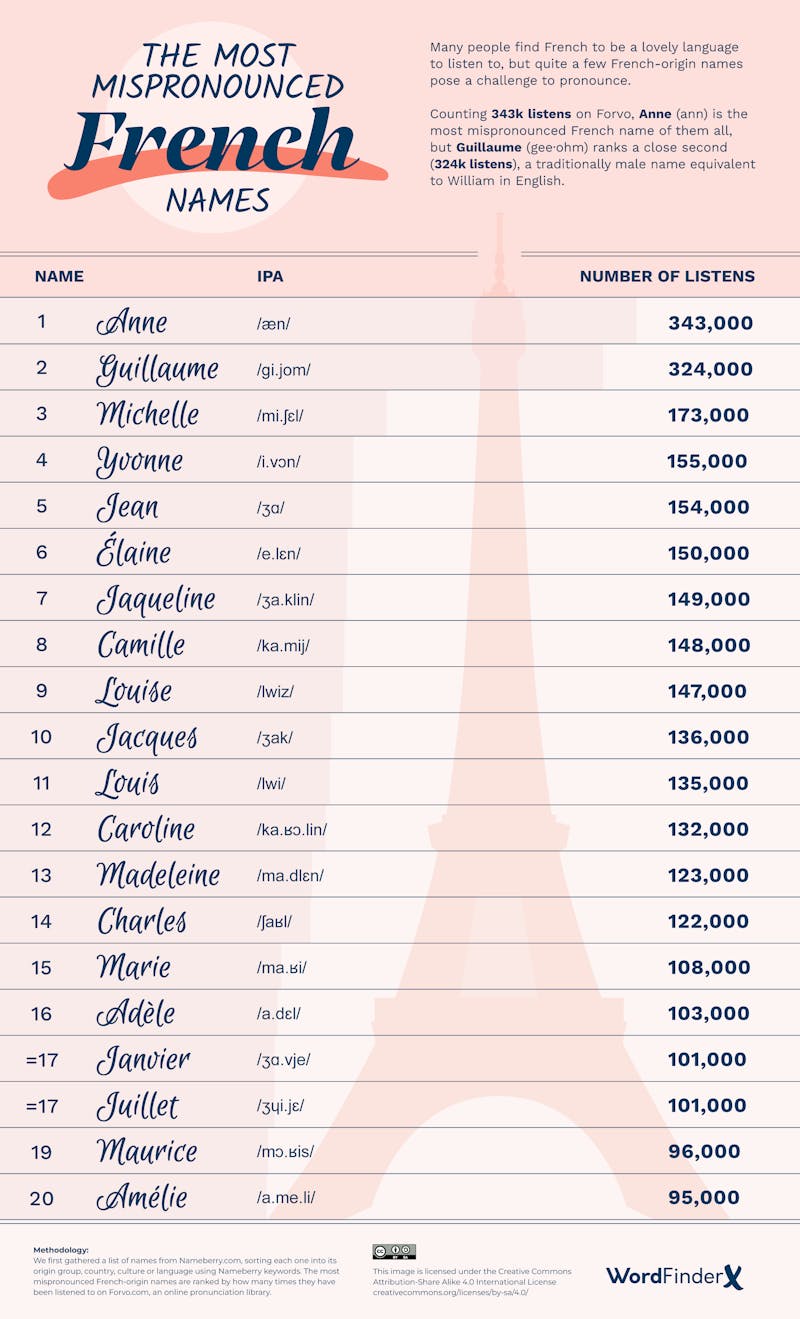The Most Mispronounced Names from Around the World

There are many situations when you might find you need to say a name out loud that you’ve previously only read: greeting a new colleague at work, attending a friend’s baby shower, approaching the dreaded attendance register ahead of the first class of the year. Or you might possess the simple desire to know — out of respect or curiosity — how to approach the unfamiliar assemblage of letters forever attached to a celebrity or new acquaintance.
Today, our hypermodern internet age provides us with endless new names to contemplate (even X Æ A-Xii's parents, Grimes and Elon Musk, disagree on how to say his name). But it also provides us with instant answers through pronunciation sites such as Forvo.
Here at WordFinderX, we like to highlight the best ways to use and unscramble words around us — so we’ve trawled Forvo’s data to find the most hard-to-pronounce names from different countries and cultures around the world.
What We Did
WordFinderX curated and categorized a list of 12,768 names and their origins from Nameberry.com. We then researched how many times each of these names had been listened to on Forvo.com, an online pronunciation library, to determine which are the most mispronounced names around the world.
Key Findings
- The Irish name Sean is the most mispronounced in the world, with one million listens on Forvo.
- Anne is the most mispronounced English name, with 343,000 listens.
- Emory is the most mispronounced name of U.S. origin, with 7,500 listens.
- Francisco is the most pronounced Spanish name, with 635,000 listens.
- Björk is the most mispronounced Icelandic name, with 85,000 listens.
Sean, with one million pronunciation checks, is the most mispronounced name in the world. The correct pronunciation stretches the vowels and involves the common Irish palatalization of the ‘s’ so that it sounds a little like the French (Jean) and English (John) names from where it originates. The high search rate for this name may partly relate to confusion over one of the most famous Seans: actor Sean Bean, whose name does not rhyme despite its appearance. Just to confuse matters further, Bean’s real first name is actually Shaun, a re-anglicized version of the name he now goes by. He took his stage name out of the belief it would be “catchier,” and… here we are.
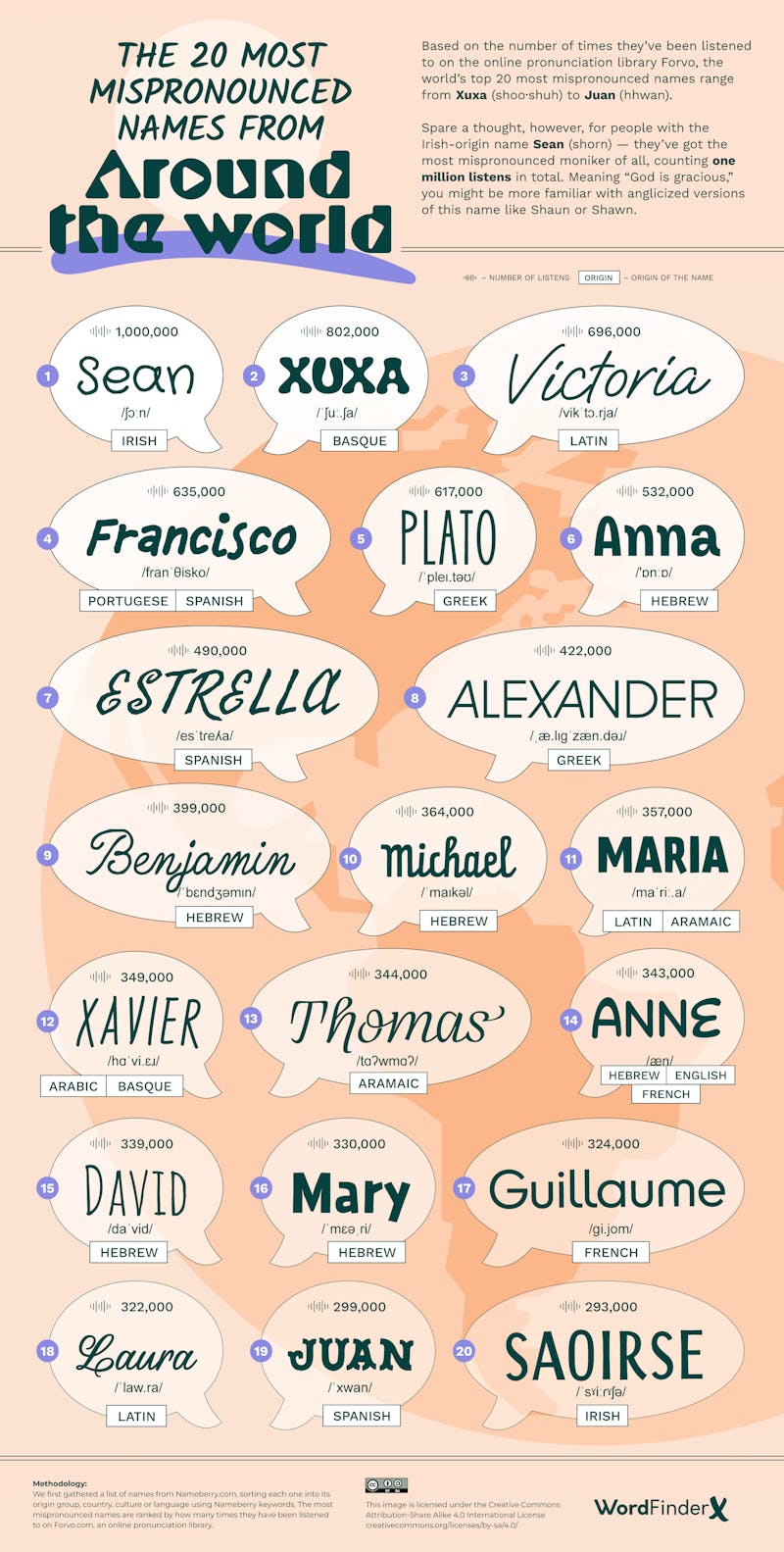
The six most difficult-to-pronounce names are all from different cultures. The second top name, Xuxa (shoo·shuh), is of Basque origin and is checked 15% more than third-placed Victoria. The Greek name Plato appears in fifth position. The Greek philosopher of the same name was actually called Aristocles; his wrestling teacher nicknamed him Plato, meaning “broad.” Whether the teacher was referring to Plato’s shoulders or his forehead is still debated — keep your options open if you’re considering Plato as a baby name.
The idea that Anne (ann) may be difficult to pronounce may seem unusual to those with English as a first language. But confusion — or rather, variety — arises internationally since an “e” at the end of a word is not always silent in other languages. Dutch and German speakers, for example, may veer towards anne-uh, while the Norwegians do the same but with an unexpectedly intense emphasis on the first syllable.
There are also English speakers who believe that the “e” means Anne should be pronounced like “Annie.” And for still others, this spelling will always be pronounced anne·with·an·e. Anne is the most mispronounced name of English origin by a considerable margin, and that probably isn’t going to change any time soon.
“Ireland was colonised by the English and our national language was all but wiped out,” writes Niamh Ní Hoireabhaird in The Guardian. “The English destroyed our language once before, so every little throwaway comment and scoff at our names hurts a little bit more — and ultimately becomes just tiresome.”
Unfortunately, Ireland’s proximity to the UK, and these countries’ tangled histories, often lead to folk attempting to Siobhan (sheh-VAHN) or Niamh (neev) according to English pronunciation conventions. Sometimes there are easier ways to remember Irish names such as number two, Saoirse (sur·shuh) — it’s “Saoirse like inertia,” according to regular Greta Gerwig and Wes Anderson actor, Saoirse Ronan.
Shakira (shuh·kee·ruh) leads the most mispronounced Arabic names by a gap of 80%. Perhaps these searches are related to the mononymous singer of hits such as Hips Don’t Lie, who is best known as a Latina but who has embraced her Lebanese heritage both in performance and through songs such as Ojos Asi.
Ahmed is also near the top. Non-Arabs have a habit of over-pronouncing the voiceless glottal fricative “h,” turning the name into ach-med.
The Spanish take on the Latin alphabet tends to trip up English speakers. The use of a double-L, for example, is a very Spanish digraph — a combination of two letters that create a new sound (like ph giving an f-sound in English). Estrella and Guillermo are commonly mispronounced Spanish names that follow this pattern.
But Spanish vowel sounds also trip up unfamiliar tongues. And while the pronunciation of Spanish letters is more consistent than in many languages, a name like Luz (loose or looth) manages to combine both a non-intuitive u-sound with a changeable final vowel: Latin Americans pronounce the “z” like an “s,” while in Spain it becomes more like a “th.”
French pronunciations have become shorter and shorter over the centuries while their spellings have remained more or less the same. Today, the last syllable of many French words is dropped, and you might spot a non-French speaker by their inclusion of the letter “s” at the end of “vous.” Throw in nasal vowels and the famous French glottal fricative “r,” and it all gets a bit much.
But in fact, if you can learn the rules, they can be applied quite consistently. Again, it’s when they all seem to bump up against each other, in the case of a name like Guillaume (gee·ohm), that it can get overwhelming. Here, the “ll” gives a “y” sound, while the first “u” does not affect the vowel sound but only softens the “G.”
Just Ask
On a big round planet of nearly eight billion people, you’re sure to meet (and even apologize to) plenty of people with names that are hard to read. But while the convenience of checking out a name’s pronunciation online before meeting somebody is undoubtedly a benefit of the internet age, showing the consideration and humility to ask them how to pronounce their name is a truly winning opening gesture to open a relationship. And it may come in very handy later on when it’s time to say, “I’m sorry.”
METHODOLOGY & SOURCES
We first gathered a list of 12,768 names and their origins from Nameberry.
Each name’s origin was categorized by ensuring a group, country, culture or language’s keyword was used to describe its origin on Nameberry.
To help classify certain origins of names, we applied the following additional rules based on more granular descriptions that were available:
- American names: American, Modern, Spelling
- African names: African, Swahili, Akan, Ghanaian, Kiswahili, Twi, Yoruba, Igbo, Ethiopian, Kikuyu, Hausa, Xhosa, Somali, Shona
- Israeli names: Israeli, Hebrew
- Native American names: Native American, Cherokee, Nahuatl, Aztec, Navajo, Choctaw, Mohawk, Sioux
We then searched each name on Forvo, the online pronunciation dictionary, to find out how many times the pronunciation of the name has been listened to by its users. Names with matching pronunciations on Forvo reduced our sample of names to 9,867.
Names were then ranked globally and per origin on how many listens their pronunciations have received in total. We removed instances of common nicknames, place names or words such as ‘Rose’ or ‘Satchel,’ which are often used with other meanings.
The data for this research is correct as of August 2023.
